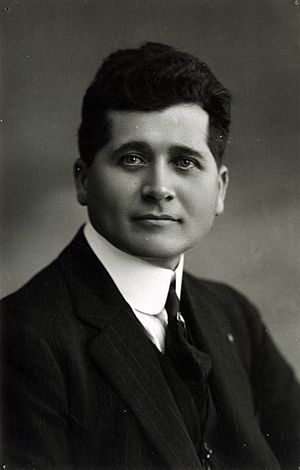Felipe Carrillo Puerto facts for kids
Quick facts for kids
Felipe Carrillo
|
|
|---|---|

Felipe Carrillo Puerto
|
|
| Governor of Yucatán | |
| In office 1922–1924 |
|
| Preceded by | Manuel Berzunza |
| Succeeded by | Juan Ricardez Broca |
| Personal details | |
| Born | November 8, 1874 Motul, Yucatán |
| Died | January 3, 1924 (aged 49) Mérida, Yucatán |
| Cause of death | Execution by shooting |
| Political party | Socialist Party of the Southeast |
| Spouses | Isabel Palma (wife); Alma Reed (fiancée) |
| Profession | newspaper owner, El Heraldo (in Motul) |
Felipe Carrillo Puerto (born November 8, 1874 – died January 3, 1924) was an important Mexican journalist, politician, and revolutionary. He is remembered for trying to bring peace between the Yucatec Maya people and the Mexican government. This was after a big conflict called the Caste War. He served as the governor of the Mexican state of Yucatán from 1922 to 1924.
Contents
Early Life and Beliefs
Felipe Carrillo Puerto was born in a town called Motul, Yucatán. This town is about 45 kilometers (28 miles) northeast of Mérida. He had some Maya heritage. His parents were Justiniano Pasos Carrillo Puerto and Adelaide Solis. He was one of 14 children.
Even though his family spoke Spanish, Felipe also grew up speaking Maya. This was the language of the children in his neighborhood.
Standing Up for What's Right
From a young age, Felipe was a socialist. This meant he believed in sharing land more fairly. He also supported women's suffrage, which is the right for women to vote. He fought for the rights of the native Maya people.
When he was a teenager, during the Caste War, he was put in prison for a short time. He had encouraged Maya people to remove a fence. This fence was built by rich landowners around community lands to keep the Maya out.
He later worked on local railways, also known as tramways. He joined the railway workers' union. He also married Isabel Palma.
Journalism and Politics
Carrillo Puerto started a newspaper called El Heraldo de Motul. In 1907, the government briefly shut it down. They said it was "insulting public officials."
In 1910, he went to a meeting in Mexico City. There, he pushed for a plan to free political prisoners. The president at the time agreed to this plan. In 1912, he became a reporter and writer for a magazine called Revista de Mérida.
A Famous Song
In 1923, Felipe Carrillo Puerto had a special friendship with an American journalist named Alma Reed. Their story was remembered in a famous song called "Peregrina." The poet Luis Rosado de la Vega wrote the words, and Ricardo Palmerín wrote the music.
As Governor of Yucatán
In February 1922, Felipe Carrillo Puerto became the governor of Yucatán. His very first speech as governor was given in the Maya language. He promised to follow the laws and help the workers.
During his time as governor, he made big changes. He started a program to give land back to the native Maya people. He took large estates and divided them up. In his first year, he opened 417 new public schools.
He also founded a university called the Universidad Nacional del Sureste. Today, it is known as the Universidad Autónoma de Yucatán (UADY).
His Final Days
Felipe Carrillo Puerto did not support a rebellion against the Mexican president. Because of this, rebel army officers captured him. He was put on trial by a military court. On January 3, 1924, he was executed by a firing squad. Three of his brothers and eight of his friends were also executed with him.
His enemies called him the "Red Dragon with the Eyes of Jade." But those who admired him called him the "Apostle of the Bronze Race." This name showed how much he was loved for helping the Maya people.
Legacy and Remembrance
In 1974, a movie about his life called Peregrina was made. The actor Antonio Aguilar starred in it.
Several towns in Mexico were named in his honor. These include Felipe Carrillo Puerto, Quintana Roo, Felipe Carrillo Puerto, Michoacan, and Felipe Carrillo Puerto, Oaxaca.
See also
 In Spanish: Felipe Carrillo Puerto para niños
In Spanish: Felipe Carrillo Puerto para niños
 | Shirley Ann Jackson |
 | Garett Morgan |
 | J. Ernest Wilkins Jr. |
 | Elijah McCoy |

